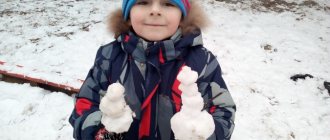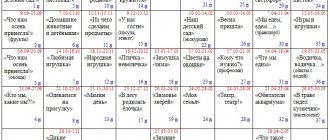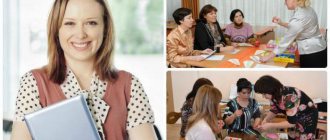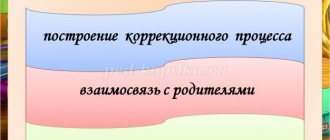Calendar-thematic plan of work on the theme of the week “Get Healthy”
Lyubov Beltikova
Calendar-thematic plan of work on the theme of the week “Get Healthy”
Topic of the week: “Get healthy”
Tasks:
1. Expanding ideas about health and the important components of a healthy lifestyle (proper nutrition, movement, sleep) and factors that destroy health, fostering the desire to lead a healthy lifestyle.
2. Development of ideas about the peculiarities of the functioning and integrity of the human body, teaching children to be attentive to their own health, to take into account the characteristics of their body and health (allergies, poor vision, etc.).
3. Formation of the ability to determine the quality of products based on sensory sensations.
4. Formation of ideas about the rules of patient care, development of emotional responsiveness and sensitivity.
Monday:
Social and communicative development (literacy)
“Analysis of the syllables SHA, SHO, SHU; SA, SO, SU” - Continue to introduce children to the sound [w] and the letter Sh; teach children to read syllables with this sound, find a stressed syllable in words, divide words into syllables.
Artistic and aesthetic development (music) - according to the plan of the music director
Cognitive development (safety)
“Traffic light road signs” tell children when the traffic light appeared, expand and consolidate children’s knowledge about traffic lights and traffic rules; give an explanation of the traffic controller’s profession and explain the signs he uses when regulating the road; remember and expand children's knowledge about road signs and their purpose/
Individual work:
D/i “Who helps you be healthy?” (1.5).
Practice jumping up from a place (10.13).
Situational conversation on the topic: “Five things to do before bed” (2.8).
Educational work during regime moments:
Morning:
Conversation on the topic: “What is health?” — consolidate the concept of “health”; expand children's knowledge about preventive measures to prevent diseases and injuries.
D/i: with Dienesh blocks “What has changed?” - notice changes in the arrangement of objects, reflect these changes in speech.
Walk:
Bird watching in the kindergarten area - teach to recognize and distinguish birds by plumage, size, voice; develop observation and memory; cultivate a friendly attitude towards birds.
Labor: cleaning the sandbox from snow and debris - to cultivate a positive attitude towards work; responsibility when carrying out assignments.
P/n: “Tag in a circle” - learn to act quickly on a signal from the teacher; consolidate movement skills with side steps in different directions; cultivate respect for each other.
Evening:
D/i: “Healthy food store” - consolidate children’s knowledge about healthy foods; We develop attention, logical thinking, speech.
Introduce children to the proverbs: “Health is more valuable than gold”, “A healthy person does not need an enemy” - teach children to explain the meaning of these proverbs; develop reasoning and dialogical speech; We cultivate a careful attitude towards our health.
Independent activities:
Looking at illustrations about various sports.
Independent games for children with external materials.
Offer children coloring pages on the topic “Vitamins from the garden.” Improve your pencil skills.
Interaction with families of pupils:
Talk with parents about the well-being of their children.
Individual conversations and consultations at the request of parents.
Tuesday:
Speech therapy according to the speech therapist’s plan.
Physical development
L. I. Penzulaeva (senior group, No. 31, p. 44) - exercise children in running with changes in the tempo of movement, in walking between objects (“snake”); repeat dribbling the ball while walking, moving to the designated place; practice climbing through a hoop with a ball in your hands, in balance.
Artistic and aesthetic development (sculpting/applique)
“Shoe in a Puddle” - teach children to cut out double silhouettes of paired objects. Improve and diversify applicative technique. Learn to accurately convey the form and give it additional expressive features. Develop creative imagination. Cultivate an interest in learning about the world around us.
Individual work:
Game for developing attention “Ear, nose, hand” (3.12).
Practice jumping in place with turns to the right, left, around yourself (6.17).
Laying out figures from waste material “Lay it out yourself” (26).
Educational work during regime moments:
Morning:
Conversation on the topic: “Who am I?” - to give children an idea of the appearance of a person, of his characteristics as a living organism. Arouse the child's need to talk about himself.
Making and guessing riddles about the structure of the human body is to develop memory and thinking.
Walk:
Observing pigeons - expand knowledge about the appearance of birds, their habits and habitat; form real ideas about the life of birds.
Collective cleaning of the area from remnants of snow and debris - to teach cleanliness and order in the area.
P/n: “Catch up with the pigeon” - improve agility, speed (run at the signal, without looking back).
Evening:
Sedentary game “What the hands can do” - develop memory and reaction speed, throwing accuracy and dexterity when receiving the ball, verbal vocabulary, expressiveness of movements; to form honesty when following the rules of the game.
S-r/i: “Hospital” - practical consolidation of acquired knowledge. To cultivate respect for the medical profession, to understand its enormous importance for each of us.
Independent activities:
Looking at illustrations from the book “My Body.”
Independent games for children with external materials (flags, balls, ribbons).
Board games: “Loto”, “Puzzles”, “Labyrinths”.
Interaction with families of pupils:
Prepare a consultation for parents on the topic: “Prevention of colds.”
Wednesday:
Cognitive development (mathematics, development of horizons
E. V. Kolesnikova (lesson 11) – learn to guess a mathematical riddle, write down the solution using numbers and signs; write the number 7, ordinal counting, answer the questions correctly: how much? On the counting place, lay out a rectangle from counting sticks, draw rectangles in a checkered notebook, transform the square into other geometric shapes. Introduce the number 7. Develop skills of self-control and self-esteem.
Physical development
L. I. Penzulaeva (senior group, No. 32, p. 45) - exercise children in running with changing the pace of movement, in walking between objects (“snake”); repeat dribbling the ball while walking, moving to the designated place; practice climbing through a hoop with a ball in your hands, in balance.
Social and communicative development (labor)
“Ambulance for toys” - teach children to take care of toys, make sure that scattered and broken toys do not turn into garbage, make sure they are complete, and turn blue. Improve manual skills in working with broken toys. Continue to teach children to work in a team. Foster a sense of responsibility for a common cause.
Individual work:
Didactic game “Boys and Girls” (7.14).
Strengthen balance skills by walking on a gymnastic bench (15.20).
Offer to lay out a pattern from wooden sticks or matches “Lay out a pattern” (25). Educational work during regime moments:
Morning:
The situation of communication on the topic: “What do I know about myself” is to draw the child’s attention to himself, to his body, his organism, to his capabilities and abilities.
CGN at the table - continue to teach children how to behave correctly at the table while eating (sit up straight, do not sway in the chair, do not rush and do not talk with your mouth full); cultivate cultural behavior at the table, neatness.
Walk:
Observing the clothes of adults and children - continue to develop the ability to establish the simplest connections between changes in living and inanimate nature.
Labor - putting things in order, collecting branches and old leaves - promotes the desire to work together, to experience the joy of communicating with each other.
P/n: “Catch up and jump” - achieve good jumping technique when taking off.
Evening:
D/i: “Assemble a human figure” - consolidate the child’s knowledge about the structure of the body. Develop spatial understanding of the human structure.
Ball game “Air, earth, water” - consolidate children’s knowledge about natural objects. Develop auditory attention, thinking, and intelligence.
Independent activities:
Offer the poster “Parts of the Body” to the children to look at.
Independent games for children with outdoor materials (buckets, snow shovels).
Printed board game: “Collect physical education equipment” (ball, jump rope, cube, etc.)
Interaction with families of pupils:
Conversation with parents on the topic: “How to dress?” (offer a table for choosing clothes taking into account different temperatures).
Thursday:
Speech development
A retelling of K. Ushinsky’s work of art “Medicine” - to cultivate a feeling of love and affection for the closest and dearest person - mother; develop a desire to care for those closest to you; learn to analyze text using questions and answers; consolidate the skill of consistency in retelling; develop dialogical and narrative speech.
Artistic and aesthetic development (music) - according to the plan of the music director
Artistic and aesthetic development (drawing/decorative arts)
“Children do exercises” - reinforce how to make a sketch with a simple pencil and then paint over it with colored pencils; arouse interest in sports; develop fine motor skills; to form in children the desire to complete the work they start.
Individual work:
Solving the problem situation “Why do you need a handkerchief?” (18.24).
Learn to run long jump (4.9).
Practice cutting out symmetrical pieces from paper folded in half (19.22). Educational work during regime moments:
Morning:
Compiling a story with children on the topic: “How different we are” - teach children to compose a coherent story about another person (name, age, height, hair color, eye color).
R/i: “The fourth odd one” - strengthening children’s ability to identify a common feature in words, develop the ability to generalize.
Walk:
Observation of cirrus clouds - to develop the ability to see the beauty of the sky; develop creative imagination; evoke a desire to fantasize.
Labor: clearing paths - develop in children the ability to correctly perform relevant labor operations.
P/n: “Find where it’s hidden?” -to develop endurance, observation, and parity in children.
Evening:
Construction from planar geometric shapes: “Sports equipment” - development of children’s logical thinking.
Musical game: “Walk” - developing a sense of rhythm.
Independent activities:
Invite children to work with pictures-photographs with various images of emotions “Kaleidoscope of Emotions”.
Independent games for children with external materials.
Role-playing games on the site.
Offer children counting sticks to lay out according to the diagrams.
Interaction with families of pupils:
Prepare a consultation for parents on the topic: “Time for healthy walks.”
Friday:
Cognitive development (construction)
“Sport is life” - to develop the ability to comprehend the proposed models in diagrams and reproduce them from the designer, to consolidate and develop the concept of a healthy lifestyle, focusing on playing sports, to enrich the vocabulary of children.
Physical development (street)
L. I. Penzulaeva (senior group, No. 33, p. 45) - practice slow continuous running, throwing the ball in ranks; repeat game exercises with jumping and running.
Speech development (reading fiction)
Compiling a story based on proverbs - to give children an idea of genre features and the purpose of proverbs; learn to comprehend the meaning of proverbs.
Individual work:
Situational conversation “Children, drink milk - you will be healthy!”
(23,27).
Practice jumping in place with turns to the right, left, around (11.21).
“Didactic game “Who do I look like?” (16).
Educational work during regime moments:
Morning:
Reading K. Chukovsky’s “Moidodyr” - develop the ability to listen to a work of art and respond emotionally to it.
Looking at the poster “There is a time for every activity” is to show children the relationship between maintaining a daily routine and a healthy lifestyle.
Walk:
Observation of icicles - enrich children's knowledge about inanimate natural phenomena; activate children's vocabulary; consolidate knowledge that you cannot walk under large icicles and eat them.
Labor: sweeping paths with a broom - to teach to carry out work assignments.
P/n: “Sly Fox” - to develop endurance and observation in children.
Evening:
Experimental activity “Properties of Ice” - invite children to make colored pieces of ice, do experiments with them: look at the sky through them, roll a stick along the path.
Watching the cartoon “Oh and Ah” will enrich children’s knowledge about a healthy lifestyle and emotional perception.
Independent activities:
Offer children pictures to look at based on the plot of the works by E. Moshkovskaya “Ears”, K. Chukovsky “Moidodyr”, A. Barto “The Dirty Girl”.
Independent games for children with external materials.
Invite children to play with Cuisiner sticks and Dienesh blocks.
Interaction with families of pupils:
Invite parents to start a new family tradition - doing family morning exercises on weekends.
Action plan for 04/07/2016 “Health Day”
| time | event title | Responsible |
| 07.30-08.00 | "Morning of joyful meetings" | |
| 08.15-08.25 | General morning exercises on the playground of the kindergarten “Health is fine. Thanks to the charger" | Physical education instructor E.S. Lyashova |
| 08.30-09.00 | "Breakfast of the Champion" | |
| 09.00-09.10 | Thematic conversation “Lessons from Moidodyr” (1st junior group) | Teacher Abdulaeva N.A. Grechishkina L.M. |
| 09.00-09.20 | Thematic conversation “To be healthy” (middle/high school) | Teacher Prudnikova T.G. Grechishkina L.M. |
| 09.00-09.30 | Thematic conversation “A healthy mind in a healthy body” competition games (preparatory group) | Teacher Kiriyak V.N. |
| 09.45-10.30 | Event “We will say “YES” to health” | Physical education instructor E.S. Lyashova |
| 10.45-11.15 | Outdoor games “Hit the target”, “Ball in a circle”, “Find your house” (1st junior group) | Teacher Abdulaeva N.A. Grechishkina L.M. |
| 10.45-11.30 | Outdoor games “Visiting the Hedgehog”, “Squirrels - Burners” (middle group) | Teacher Prudnikova T.G. Grechishkina L.M. |
| 10.45-12.00 | Outdoor games “Sly Fox”, “Owl”, “Bug and Hares” (preparatory group) | Teacher Kiriyak V.N. |
| 11.50-12.30 | "Olympian's Lunch" | |
| 15.00-15.10 | Gymnastics of awakening “Who sleeps sweetly in bed? It's high time to get up. Hurry up to exercise, we won’t wait for you!” (all groups) | Group teachers |
| 15.20-15.30 | Afternoon snack: “One, two, three – refresh yourself, then go in for sports” | |
| 15.40-15.55 | Review of the album “Summer Sports” (middle group) | Teacher Prudnikova T.G. Grechishkina L.M. |
| 15.30-16.00 | Evening of riddles and games “We are friends with physical education” (preparatory group) | Teacher Kiriyak V.N. |
| 16.00-16.30 | Dance marathon “Towards each other” | Physical education instructor E.S. Lyashova |
| During the day | Photo report for parents “We are friends with physical education” | Group teachers |
Preparatory stage
- arrange groups according to the theme of the day
- prepare information for parents in parent corners: “Health is the head of everything”;
- develop symbolism for the day.
- for parents thematic leaflets “Living healthy is great!”
- for groups, come up with entertainment, games, relay races.
- develop a thematic plan for working with children during the day (content of the valeological hour, activities in the physical education corner, formation of the group of children, productive activities, etc.);
- reading fiction about sports, physical education, a healthy lifestyle, etc.;
- learning riddles and sports-themed songs;
- looking at illustrations depicting different sports.
- conversations and activities with children about a healthy lifestyle, maintaining health, healthy food and vitamins;
Main stage (practical implementation of the project)
Health Day at MBDOU No. 5 “Smile” under the motto “ We will say “YES ” to health.”
Health Day in kindergarten is not just part of educational work, it is also a holiday for children, their parents and employees.
Early in the morning, fairy-tale characters greeted everyone with wishes of health, the cat Matroskin and the nurse Neboleyka offered vitamins to children and parents, and distributed to parents thematic leaflets “It’s great to live healthy!” and invited everyone to a musical game and sports exercises. A fun warm-up was accompanied by music and artistic expression.
Before breakfast, children, parents and staff went out for sports exercises on the playground of the “Health is OK” kindergarten. Thanks to the charger"
Especially for the holiday, the medical staff of the preschool educational institution developed a “Fabulously healthy menu.”
After a tasty and healthy breakfast, the preschoolers had thematic discussions:
“Lessons from Moidodyr” (1st junior group)
“To be healthy” (medium.)
“A healthy mind in a healthy body” competition games (preparatory group)
In each group, teachers organized interesting and exciting competitions.
After interesting and exciting conversations, the children went to the event “We will say “YES” to health”
At the beginning of the event, the children visited the country of “Correct Speech,” where they recited poems, solved riddles, played communicative games and performed exercises to develop speech breathing.
Here the children remembered the rules of personal hygiene that they must observe during the day.
Aibolit talked with the children about what health is, how to maintain, strengthen, and preserve it.
With Aibolit we sang songs and danced the dance “Zverobika”. Cheerful Aibolit entertained the children; they tested their strength, dexterity, and speed.
While the children were playing, an unhealthy Carlson appeared, he held his heart, his lower back, and groaned. The children found out why Carlson got sick and helped him recover. They told him the rules of personal hygiene, showed him personal items, played games with him about healthy eating, and sang songs.
In the afternoon, festive events took place in groups. The teachers conducted role-playing and outdoor games, looked at albums “Summer Sports”, held an evening of riddles and games “We are friends with physical education”, created problem-based game and practical situations aimed at developing ideas about a healthy lifestyle, preserving and strengthening physical , mental, somatic health. In the evening, parents, children and staff participated in the dance marathon “Towards each other”, where they danced ………………… to a cheerful, rhythmic melody.
The teachers, together with the children, took a responsible approach to completing the task given the day before; the children shared their impressions with their parents about the past day.
This event ended with a photo report for parents “We are friends with physical education,” where teachers showed their best moments about the health day.
The children were delighted with Health Day, parents and staff also received a charge of vivacity and good mood, then they remembered the holiday for a long time and with warmth and wished each other health!



